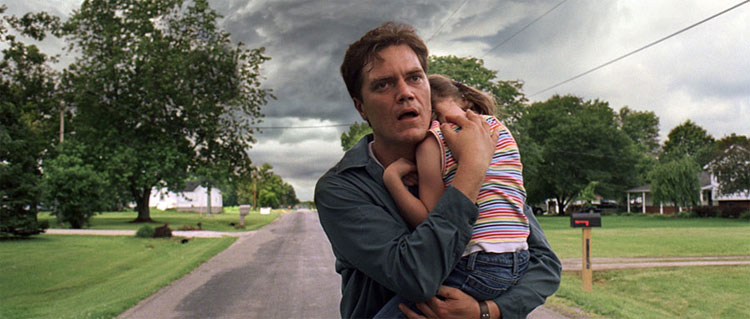
Fans of Martin Scorcese’s HBO series Boardwalk Empire won’t be surprised by the powerful performance Michael Shannon gives in Jeff Nichols’ Take Shelter. Playing disturbed prohibition agent Nelson Van Alden, the actor has been the stand out performer so far in just under two seasons of the period drama, outshining the likes of Steve Buscemi, Michael Pitt and Kelly Macdonald in the process. Shannon adds tension and volatility to every Boardwalk scene he features in and he brings this same unpredictability to Take Shelter, in his role as troubled husband and father Curtis LaForche.
Curtis lives a simple life; he works hard and takes good care of his family, loving wife Samantha and six-year-old daughter Hannah, who is deaf. However, his modest life is soon turned upside down when he’s plagued by crippling, foreboding dreams predicting an impending apocalyptic event. Curtis is then faced with a dilemma; does he listen to these dark premonitions and prepare his family for possible armageddon, facing financial ruin along the way, or are these visions nothing more than the symptoms of mental illness; a family affliction shared by his mother who was diagnosed with paranoid schizophrenia in her early thirties.
Like Mike Cahill’s Another Earth, a similarly subtle film featuring commanding performances, Nichols’ Take Shelter is not an easy film to label. Where Another Earth is a character/relationship piece wrapped in a science fiction shell, Take Shelter could easily slip into either a family drama or an apocalyptic tale category. Like Cahill’s movie, where the discovery of “Earth 2” is almost seen as the supporting narrative to its main character-driven story, the possible end of the world scenario facing the characters of Take Shelter is only ever viewed from within the tightknit LaForche family. Nichols’ story of the potential ‘end of days’ isn’t concerned with how or if the world would survive if Curtis’ visions come true, but instead if his family and his mind will survive his possible descent into mental illness.
Where films like 2012, Armageddon and The Day after Tomorrow relied on the believability of their catastrophic scenarios (Mayan predictions coming to pass, meteors destroying Earth or abrupt climate change), Take Shelter relies solely on the credibility of Curtis’ off kilter convictions. Nichols’ film will only succeed if there are some doubts over his premonitions; do you instantly write them off as the ramblings of a mad man or believe he may have been gifted a glimpse into a doomed future? For me it just took one look into the askew stare of Shannon for doubt to set in, could this be the gaze of a man losing his grip on reality, or a man with a devastating insight into things to come.
Shannon’s overwhelming performance is well supported by some equally robust turns by Jessica Chastain (Tree of Life) and Shea Whigham (Shannon’s co-star in Boardwalk Empire), their wavering support and trust in their loved-one only magnifying Curtis’ volatile situation. However, there’s no mistaking that this is Shannon’s time to shine, his performance taking you on a chaotic downward spiral with dizzying effects, the apex being a scene in which he aggressively confronts his doubters at a charity dinner, a scene that sent shivers down my spine and goosebumps up my arms.
There’s a storm coming like nothing you’ve ever seen, and not a one of you is prepared for it!
Take Shelter will leave viewers feeling battered and weather-beaten at the end of its two hour duration and what you take from Nichols’ film will depend largely on what you came looking for. Those looking for an Emmerichian end to civilization may be disappointed, but those searching for something else, something less obvious, might be totally blown away.
Even how you read the final scene (warning: this link contains spoilers) can probably reveal a lot about yourself.


